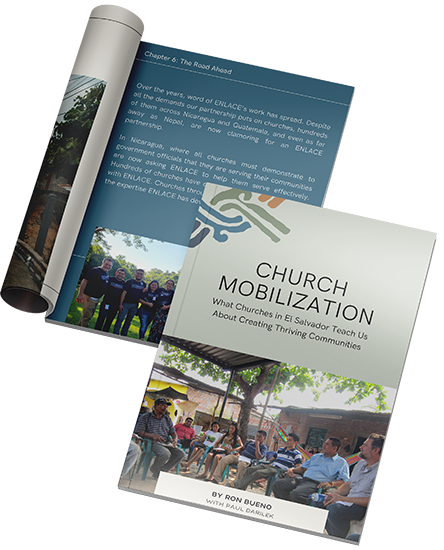Where we work
ENLACE began in 1993 as church leaders across El Salvador started to envision their churches as redeemed bodies at work to restore relationships, transform communities, and end poverty. Today, hundreds of churches across Central America and Nepal are applying for ENLACE partnerships to help them better love their neighbors, save lives, and demonstrate the gospel.

El Salvador
El Salvador is where it all began back in 1993. It’s ENLACE’s world headquarters and a fount of community development wisdom that is spreading around Central America and the world.

Guatemala
Guatemalan pastors had been studying integral mission for a decade when they invited their Salvadoran neighbors to help them serve their communities in Central America’s most culturally and linguistically diverse country.

Nepal
ENLACE Nepal began as a 2012 response to concerns about human trafficking. Christians are a poor, marginalized 0.1% minority where ENLACE works, but steadily gaining respect even as they proclaim the gospel.

Nicaragua
Our newest operation, ENLACE Nicaragua was founded by veteran ENLACE missionaries with experience in El Salvador and Nepal. Born of overwhelming pastoral demand, it is home to some of our biggest opportunities and challenges.
EL SALVADOR
In 1993 a group of Salvadoran pastors noted that following the Jesus they saw in the Bible meant serving their communities by responding to basic needs like food, water, and economic development. They envisioned their churches as redeemed bodies responding to physical as well as spiritual needs within their communities. Then they created a plan to manifest that vision. They’ve been refining and improving that plan ever since. Today, ENLACE serves 61 churches across the country with church coaching and technical support as they build relationships with community leaders, government offices, non-profits, and new friends who visit from around the world to see what they have achieved. ENLACE El Salvador leads our global family in measuring multidimensional poverty and creating sustainable solutions to end it in their communities. Some of our partner churches have worked with us for more than 20 years. It’s been a joy to watch them grow as examples of Christ-like service. Between 5 and 10 new churches apply for an ENLACE partnership each year, so we hope you will help us continue to train and equip them to end poverty in their communities as a demonstration of the gospel.
Guatemala
Guatemala is a beautiful and culturally rich country that attracts non-profits and teachers from around the world. Church leaders had been meeting for ten years to study the integral mission of the church and discuss how to best serve their communities, but what they really needed was a specific methodology and the long-term accompaniment of church leaders experienced in implementing it. When they learned what their Salvadoran neighbors to the south had accomplished, they invited ENLACE to design a pilot project with them. Over time, that pilot project evolved into a full-scale operation.
ENLACE Guatemala is unique among our Central America programs, both in its challenges and opportunities. Non-profits from around the world are well established there, resulting in many opportunities to link churches with non-governmental organizations that focus on water, sanitation, housing, agriculture, micro-finance, and many other areas of specialization. The country’s cultural and linguistic diversity has presented challenges to overcome, but also opportunities. Indigenous Mayan peoples, for example, have an ancestral as well as biblical love of the natural environment, which has translated into creation care programs like reforestation projects to restore deforested areas, prevent erosion, and restore groundwater levels.
Nepal
Tina and Sam Magar traced a human trafficking route from North India to its source in their homeland of Nepal. There, parents were promised work opportunities for their children abroad, only to never see them again. Efforts to “rescue” or buy back girls’ freedom had failed. The only solution, Tina concluded, was ENLACE’s holistic approach to transformation at the individual, family, and community levels. Everything short of that led girls right back into slavery. A staff of seven ENLACE Nepal leaders has now trained 580 leaders in 80 communities to carry out 70 projects a year impacting 25,000 people a year. Tina was right! Human traffickers are powerless to prey on communities that work together to provide opportunity and hope. ENLACE Nepal is now expanding operations into Katmandu, which we expect to enhance our strategic alliances with the international nonprofit sector.
Nicaragua
Felix and Dina Orellana served as ENLACE Church Facilitators in El Salvador where Felix is from before moving to Asia to help establish ENLACE Nepal. Once that work was firmly in Nepali hands, they returned to Dina’s home country, Nicaragua, where they encountered bigger challenges and opportunities than ever. Next to Haiti, Nicaragua is the poorest country in the Western Hemisphere. Nicaraguan church leaders wanted to tangibly serve their communities, but Bible school hadn’t taught them how to do that. ENLACE offered these pastors a methodology for developing sustainable solutions to poverty in their communities. Just as importantly, we became a partner in helping pastors and congregations alike develop a fuller understanding of the biblical basis for church participation in community development.
Christian leaders, notably denominational leaders in the Assemblies of God Nicaragua church, embraced ENLACE with overwhelming enthusiasm. The opportunity to help churches end poverty in their communities is near-limitless in Nicaragua. Challenges include government structures that exclude non-profits from community development, which limits our opportunities to form partnerships. All nonprofits, including churches, are required to demonstrate social service. This means we must take extra care to distinguish between churches that just want our help fulfilling a government requirement and those that truly have a God-given passion for serving their communities. Despite such challenges, Nicaragua is a land of near-limitless opportunity to restore relationships and help churches end poverty in their communities in the way only ENLACE does.

Download the Free eBook
Church Mobilization
What Churches in El Salvador Teach Us About Creating Thriving Communities
By Ron Bueno
